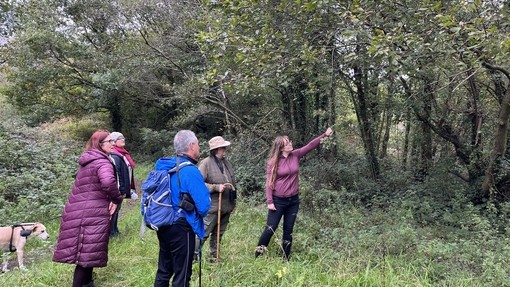Supporting individuals and communities to reconnect with nature
As part of the Working With Nature project, the University of Wales Trinity Saint David (UWTSD) is hosting a series of nature walks in partnership with Neath Port Talbot Council and other organisations to help people be in, understand and love their local nature more. An important benefit is that it is also helping participants’ well-being by reconnecting with nature.

The project, which started last October, has already supported 84 participants, and is also helping to inspire and train others to become leaders of their own walks in their communities.
The University’s collaborative project aligns closely with the Welsh Government’s aims of achieving a Healthier and more Resilient Wales, by enabling opportunities for connecting with and understanding the natural and historic environment, and the encouragement of healthier lifestyles with the benefit of improving physical and mental well-being.
By paying attention to and understanding nature more, communities can better look after their local habitats. Research has also shown that nature can generate many positive emotions, such as calmness, joy, and creativity and community connections.
James Moore Lecturer in Leadership, People, Organisational Development, Wellbeing, Diversity, and Relationships at the University’s Institute of Management and Health said: “We are supporting local people to be in, understand better and love their local nature more. We are focusing on 10 sites and using a range of expertise and “kit” to stimulate learning and excitement.
“The feedback has been so positive; people have said how much they understand and love their local environment more. Additionally, they enjoy the walks, gaining local knowledge and the mental as well as physical benefits to health they have achieved whilst taking part.”
James added: “Participants have loved ‘playing’ with the tree ID tool which was created by Elanor Alun, our Senior Ecologist and expert.
“Specifically, at Maerdy Playing Fields we observed mosses, grasses, and trees as we sampled the soil. The 4 samples gave us interesting results of fungi/bacteria and carbon levels within a few meters of each other.
“We had a great last Nature Walk of 2023 at Tonna Woodland. We spent time noticing different species of trees and considering their heritage, as well as using a Clinometer to measure the height of a tree before using a tape measure to estimate the carbon held in the tree’s main trunk.”
Local schoolchildren have also benefited from taking part in the project in Sandfields, where animal tunnels were used on consecutive days to see “who” was using Vivian Park at night! The pupils of Awel-Y-Mor loved identifying the footprints.
Building on the learning, many sessions are planned for 2024, as well as more tools, training and links between the University and the communities of Neath and Port Talbot.
For more information contact James Moore jmoore@uwtsd.ac.uk.
Further Information
Rebecca Davies
Executive Press and Media Relations Officer
Corporate Communications and PR
Email: rebecca.davies@uwtsd.ac.uk
Phone: 07384 467071
